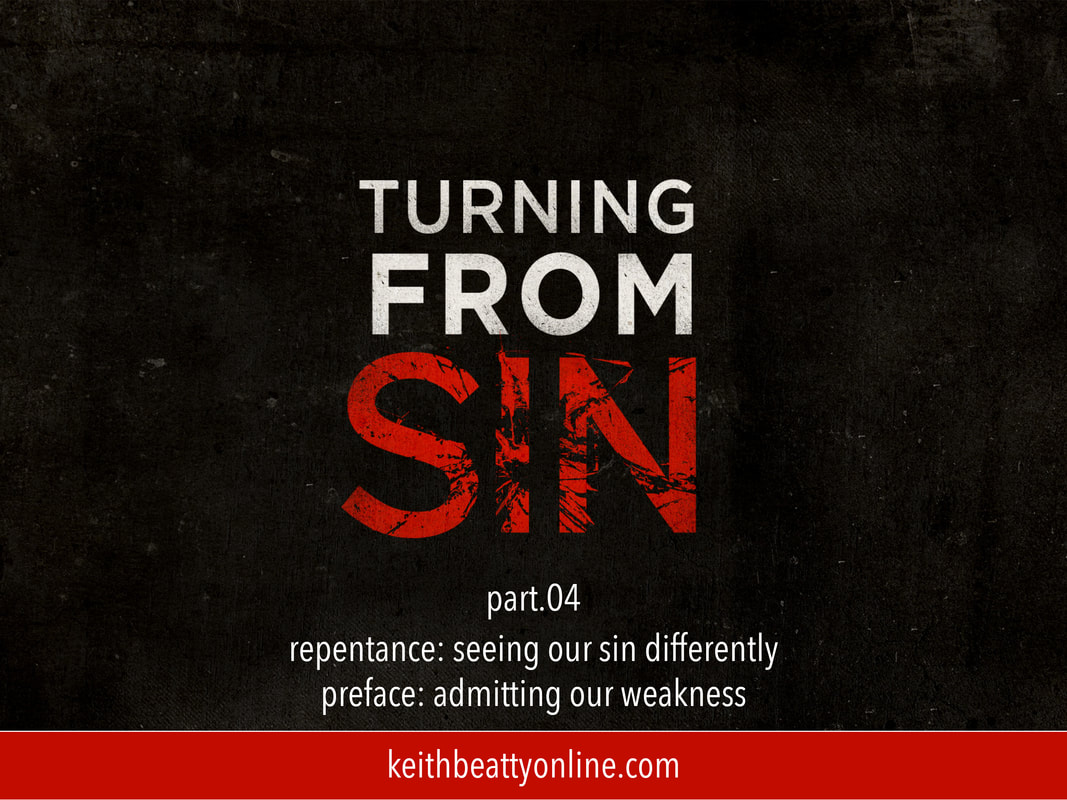|
We’ve discussed the definition of repentance, repentance in culture, and repentance as portrayed in cultural christianity. Today, let’s look at how we personally see our sin. Do we view it as dangerous, or do we diminish its effect on our life? Maybe we think we can control our desire to participate in sin...or stop our pursuit of it once that sin has been "tasted?" Our view will ultimately define our idea regarding the importance of repentance. Clinging to Salvation While Retaining Our Affinity for Sin I would say that many among us, if not all of us taking the time to read a Christian blog, would admit that we desperately cling to salvation. Salvation is the foundation of our eternal hope. However, in the interim, between here and our eternal home, are we also clinging to sin...on purpose? Let’s admit that we find many sins attractive. It’s something we often desire to do, because our flesh nature seems to always be starving. Our sin nature is frequently more hungry than our thirst for righteousness is thirsty, and it's screaming to be fed. And then there's Satan…well, we know that he’s the best salesman for convincing us that “one taste” of sin won’t hurt us…because sin is "forgivable," and "God will understand." Remember, we have grace, and we’ve “culturally established” it to be cheap and easy to abuse. So, go ahead and sin…feel good about it, because God loves you and wants you to be entertained. Moreover, God will bend His perfect will around that cheap grace in a manner that allows us the comfort to do as we please. Or, maybe not... Here we find one of the most important components of the spiritual war that rages all around us…our view of sin and the importance of repentance. Humanistic Lordship…Thinking We’re in Control We love to claim Jesus as our Savior, but our native sin nature hesitates to surrender to Him as Lord. At the core of this hesitation is our tendency to be obedient to self alone, lacking a true desire to serve anyone or anything that doesn’t serve our whims and our very self-centered ideals. We often convince ourselves that we can control our sin nature, because we are strong and always in complete control of our life (humanism). We think that we can wade into a "little sin" every now and then, for amusement and satisfaction of the flesh, but we can stop at any time…or can we? The Example of A Look Too Long Marriages do not end because a spouse “suddenly and unexpectedly” cheats. Sin is not innocent, and it's seldom, if ever, accidental. It all begins with a controlled and intentional choice to stop and “look too long” at another, through lustful and sinful eyes…eyes that are seeking rebellion against God for personal gain or enjoyment. Those looks turn into deliberate thoughts, planting the early seeds of infidelity and secretly watering them along the way. In this case, the “looking” spouse absolutely knows that even their thoughts are wrong, but they continue to return to them. They continue to feed and water them, and that which is fed and watered will ultimately grow. Frankly, it will flourish. Too many times, the intentional and reoccurring visits to the sin that we think we can control end in personal and spiritual catastrophe. Families are left devastated in their wake. That first look, the one that was intentionally longer than it should have been, can easily turn into a marriage-ending adulterous affair, breaking the marriage covenant between the man and woman and between the cheating spouse and God. Where did they lose control? I would venture the thought that the loss of control began when they made their very first choice to return to that sin and not repent and not walk immediately away from that which they knew to be wrong. It’s on that second visit that they begin to compromise their spiritual integrity and character and redefine their foundational morals, because, at that point, they have already made the choice to "embrace" a little rebellion…and, it’s a desperately slippery slope from that point forward. Sin grows because of our purposed interaction with it. It grows because we visit with it…time and time again, often in secret. We make it a friend. We enjoy its company, and we convince ourselves that our affair with sin will be short...but it never is. The more we play with sin, the more attractive it becomes, and the less cognizant we are of the damage it is actually doing in our life. Playing God with Our Weaknesses We think we can handle a little “look” that’s too long…or a little depravity of thought. Possibly, we feel that sharing a little lie regarding someone else is innocent enough to revisit with others who may find it interesting? Maybe it’s viewing a little pornography or stealing…just a little? Or, we may just harbor resentment towards our fellow man…a bitterness that we have learned to embrace regarding someone else? It's actually become a comfort in our life, because it makes us feel better about ourselves, if only for the moment. We know it’s wrong, but we can handle it, because we’re strong and in control. No one really knows about it, and we’ll repent later, because right now the enjoyment outweighs our guilt. But, the call of Scripture remains… and it cries out: “Repent.” Turn away from sin, and stop revisiting it. Stop befriending it. If we truly love the Lord, and if we truly seek to become the “new creation” that God intends, then we must be willing to release our firm grasp on that which Christ came to save us from…that which separates us from the intimate relationship that God desires. We should know that giving into sin is a choice to place something else in God's rightful place in our life. When we give in to sin, we give up God at that moment...replacing Him and His commands for the pursuit of our own fancy. We become Lord. We all struggle with our sin nature, because we struggle with lordship. It’s much easier to sin than it is to address a change in our desire to sin. But, the change must be from the inside out, and it starts with our release of control, admitting our weakness in desiring to sin in the first place, and setting our mind on Christ and not on the things that enslave us to a sinful and worldly existence in this life. It starts with a frank and honest reevaluation of exactly how we view sin, our weakness, and the repentant nature that should mark the life of every disciple of Christ. Next: Repentance- Seeing Our Sin Differently: The Instruction of Scripture
0 Comments
Leave a Reply. |
AuthorKeith Beatty is a Worship, Missions and Media Pastor living in North Alabama. He's excited and very humbled to be a follower of Jesus Christ! Archives
April 2023
Categories |


 RSS Feed
RSS Feed